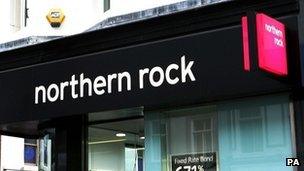Northern Rock sale: Labour's Ed Balls questions timing
- Published

There will be no compulsory redundancies beyond those already announced for at least three years
Shadow chancellor Ed Balls has said there are questions about the timing of the Northern Rock sale to Virgin Money.
Mr Balls told the BBC it was "good news" that Northern Rock was being returned to the private sector but said holding on to it for longer may have reduced the loss to the taxpayers.
Chancellor George Osborne said the sale was the "best deal" for the country.
But Tory colleague Mark Field suggested the bank had been let go "for a song" and it was a "missed opportunity".
The sale of Northern Rock to Virgin Money for £747m, due to be completed by 1 January, was announced by the government, external nearly four years after it was nationalised in early 2008 following its near collapse at the onset of the global credit crunch in 2007.
'Value for money'
BBC business editor Robert Peston says taxpayers had injected £1.4bn into Northern Rock and, on paper, they would end up with a loss of somewhere between £400m and £650m from the deal.
In addition to the £747m the government will get back following the completion of the sale, there is the potential for the Treasury to receive a further £280m over the next few years, he added.
Chancellor George Osborne said: "We are creating a powerful new presence on the high street"
Mr Osborne said: "The sale of Northern Rock to Virgin Money is an important first step in getting the British taxpayer out of the business of owning banks.
"It represents value for money, will increase choice on the High Street for customers, and safeguards jobs in the North East."
But Mr Balls questioned whether the sale was the best option on the table.
"Why has he decided to sell the bank now rather than at a later stage?" he told BBC Radio 5Live. "Would that have led to a smaller loss or to a profit?"
Shadow Treasury minister Chris Leslie later wrote to Mr Osborne asking for clarification about what the loss to the taxpayer would be, what advice the chancellor received prior to approving the disposal and how the proceeds of the sale would be used.
Concerns
Mr Field, Conservative MP for the Cities of London and Westminster, said he favoured a "more imaginative" solution such as re-mutualising the firm.
The outcome "did not augur well" for what would happen when the government came to sell its stakes in the Royal Bank of Scotland and Lloyds Banking Group, he added.
"I am very concerned about whether we are getting really good value as a taxpayer for this," he told BBC Radio 4's World at One. "There has to be a sense that Richard Branson has got this deal he was craving four years ago for a song."
But Treasury minister Mark Hoban told the same programme ministers had asked the mutual sector to come forward with a workable proposal to reconstitute Northern Rock but they had been unable to do so.
Asked if the sale was going ahead now because the government needed the money, he replied that ministers thought "this a good deal for the taxpayer" and that "holding onto it for a few more years wasn't going to realise an increase in value for the taxpayer".
After nationalisation the government split the bank into two, Northern Rock plc and Northern Rock Asset Management, with its bad debt placed in the latter.
Northern Rock plc will be rebranded as Virgin Money, which has pledged no compulsory job cuts for three years. The bank currently employs 2,500 people, down from 5,500 when it was nationalised, and has more than 70 branches.
The government said Northern Rock customers would see no change to their accounts and services, and would not need to take any action.
The size of the losses contained in the bad bank part of Northern Rock are still uncertain, but could amount to as much as £21bn.
'Secure future'
Virgin Money has pledged to establish a new headquarters in Newcastle, where Northern Rock is based. If it sells or lists Northern Rock on the stock exchange in the next five years, it will have to pay the government an additional £50m to £80m.
The Unite trade union said it hoped the announcement of the sale to Virgin Money "will be the start of a secure future" for Northern Rock's workforce.
Michael Stephenson, general secretary of the Co-operative Party - which is a sister party to, and jointly runs candidates with, the Labour Party - called the sale "a bad deal", saying Northern Rock should have been mutualised.
"The sale to Virgin is a resurrection of the failed former model. This fire-sale demonstrates Osborne is not willing to think long term about how banks can serve their customers and reduce risk for taxpayers," he added.
The bank was formed in 1997 when the former Northern Rock Building Society floated on the London Stock Exchange. It was delisted following its nationalisation.